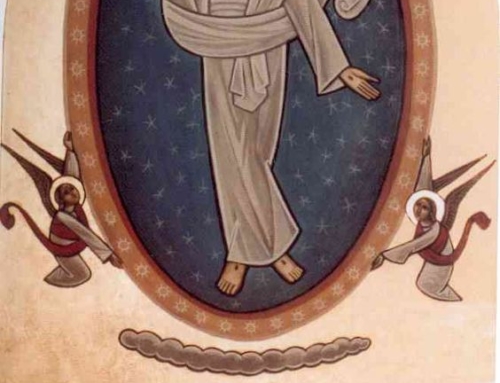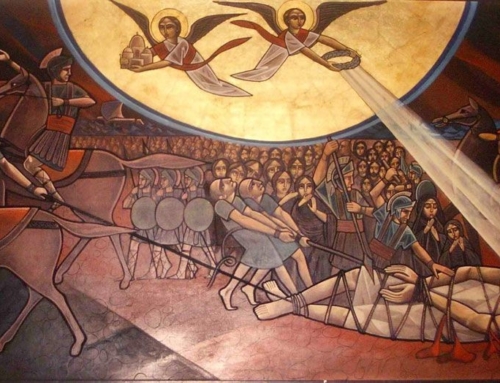Great Lent: Temptation
We are now in the second week of Lent and you may notice temptations increasing;

‘For we do not wrestle against flesh and blood, but against principalities, against powers, against the rulers of the darkness of this age, against spiritual hosts of wickedness in the heavenly places’ (Ephesians 6:12).
Some may question: why was Jesus tempted?
It can be bewildering to try to comprehend many of the acts of ministry Christ undertook that seem to us to be unnecessary; however, behind all that He did, although it may not be evident at first glance, we can find a purpose. Corruption had become ingrained into our nature; Christ, in His love, came “to bring the corruptible to incorruption…that thenceforth corruption might be stayed from all by the grace of the resurrection” (St. Athanasius – On the Incarnation). When Christ became man, He sanctified the flesh and all of humanity. Christ did not confront the devil with the power of the Godhead, but He trampled over him with His body, a body “liable to suffering and death, so that by this body, sin should not enter the world once more….that in this body He may triumph over the prince of sin” (St. Gregory of Nyssa, cited by St. Severus of Antioch).
The devil tempted Christ through three methods. Firstly, through bread – the most superficial and most universal temptation we all share. St. Jerome highlights the significance of the temptation of food as “the first man yielded to the tummy…and therefore he was expelled from paradise to the valley of tears.” Fr. Alexander Schmemann explains to us that Adam’s fault was that he rejected a life given to him by God and preferred a life dependent on “bread alone”; He depended on food whereas the only object of belief is dependence on God and God alone (Great Lent).
On a sermon given on spiritual warfare, Fr. Thomas summed up the greatest trick of Satan in that “Satan offers sin in the form of virtue.” This trickery is demonstrated in Matthew 4:5-7:
‘Then the devil took Him up into the holy city, set Him on the pinnacle of the temple, and said to Him, “If You are the Son of God, throw Yourself down. For it is written: ‘He shall give His angels charge over you,’ and, ‘In their hands they shall bear you up, Lest you dash your foot against a stone.’”
Whereas the first temptation demonstrated a desire to gratify our flesh, the second temptation in fact suggests a prideful desire for spiritual elevation; Adam fell also in this great sin of pride (Fr. Matthew the Poor- On the Mount of Temptation). We are reminded of how ego-centric the soul can easily become, even after fasting and piety. Yet, if we focus on understanding what it meant for Christ to become incarnate, we see in fact that it is most crucially an act of humility. St. Paul reminds us that He took on the “form of a bondservant” (Phil 2:7) up to the point of death for the sake of our salvation. St. Macarius the Great says that “through humility He conquered the devil” (Homily 27:5).
Lastly, the devil’s third attempt to entice Jesus was through the cross. When the desires of the flesh and the spiritual warfare gets too much, and are seemingly unmanageable, the solution – a lie – appears to us: that we should give up, surrender to these desires. But St Paul explains to us that “we also glory in tribulations, knowing that tribulation produces perseverance; and perseverance, character; and character, hope. Now hope does not disappoint, because the love of God has been poured out in our hearts by the Holy Spirit who was given to us” (Romans 5:3-5). Imagine that! After persevering through our sufferings and tribulations, during which we often mistakenly believe there is no hope, we can finally rejoice because the power of the Holy Spirit seals eternal hope within us.
Thus the Temptation on the Mount demonstrated for us that our Lord Jesus “permitted the temptation for Himself just to teach His children how they can fight” (St. Augustine) and to remind us that it is through fasting that man recovers his true spiritual nature.
Joanne Rozeik







